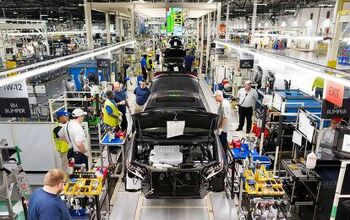Bailout Watch 31: Ford: The Loan That Dare Not Speak Its Name
Last Friday, at the celebration of the Model T’s 100th anniversary, Bill Ford kept referring to the $50b federal loan guarantee proposal in the most oblique manner possible. “I’m very happy that both presidential candidates have endorsed this,” Ford said, as reported by the The International Herald Tribune. “The leaders of both parties are embracing this as something that they believe in, so that’s got to help us.” Billy’s once-heir apparent Mark Fields shared the non-nomenclature: “This is not about benefiting Wall Street like maybe some of the other actions that have been taken. This is benefiting Main Street, the working men and women. The auto industry is part of the backbone of the U.S. economy.” OK, so that brings us to today’s article in Automotive News [sub], where Ford CEO Alan Mulally has announced to the world that FoMoCo is “ready” for the bailout loans. “The only conversation we have now is, what is the right way to finance, and what is the right provision for deciding which companies participate,” Mulally opined. “We are very positive.” And that’s it. No wait. “I absolutely don’t think it’s a bailout.” And “We are in very good shape as far as liquidity.” That said, Mulally stressed that “current conditions” are the toughest he has seen in his nearly four decades in U.S. industry. Really? C’mon. I thought Boeing was on the ropes when Big Al took over. And what about the LAST energy crisis? And if liquidity’s so great, why borrow from the feds? These guys want to play it both ways: we need the money and we don’t need the money. That’s so annoying.
More by Robert Farago


































Comments
Join the conversation
On many various message boards across the Web the constant response to bail-out is to heck with those auto firms. I am surprised how many comments also mention the huge salaries and the many benefits, golden parachutes, etc. the upper management possesses. A bail-out will not be popular with the masses but the political elites take care of their brethren in the private sector.
They must be hurting to be wanting that loan. Honda/Toyota could temporarily have a gentleman's agreement on a "price war" to really turn up the pressure on the big three. How cheap would "dirt cheap" be on a Prius? Realistically. If one could get a Prius for ~$18k, would that be a good deal? I know ~$16k would be. End of year model clearance special? How low could they let Civics go for? I'm surprised the smaller ones(Subaru, Mitsubishi, Nissan) don't play the price war game more fiercely. Bargain hunters and people looking for cheap transportation would be buying those cars up. I guess a Yaris at the invoice price of $10,856 just isn't exciting or compelling enough for someone to get out of their seat and head down to the dealership. A case of the PT Cruiser($9,988). It doesn't matter what the price is, no one is heading down to the dealer to pick one up! With certain cars, it's not so much the price as it is it's desirability. Still though, I think a case could be made that Mitsubishi would sell more Eclipses if the price was lower. It would be interesting to see just how many at each lower price gradient. Imagine a situation of affordable and available Tesla's. That would make for a nice commuter. On that note "... are built in Britain, so labor costs are high". http://www.businessweek.com/magazine/content/08_37/b4099060491065.htm There you have it. How much would a Tesla cost if it wasn't built in England?
What happens with these loans in the case of bankruptcy? For a GM or Ford C11 filing, the repayment of the loans would likely just be a provision of their reorganization. But what if Chrysler goes into C7? Cerberus paid $7.4bil for 80% of Chrysler, so extrapolating, Chrysler is worth about $9bil; much less than their one third share of $50bil. Unless there are some heavy cover-our-ass clauses in those loan guarantees, the government is setting themselves up for a major shafting.
Re: Boeing My understanding is that Boeing outsources major components of aircraft production to foreign firms in order to secure sales from the airlines of those nations. This makes some business sense, especially when dealing with export-driven nations. Also, Boeing does not wish for the Japanese (or others) to begin making large passenger aircraft themselves so they throw subcontracting business to those countries. Boeing only has one competitor in Airbus. Remember that larger businesses like to have barriers to keep small, upstart players out of the game. Boeing is using the outsourcing strategy as one method to thwart the creation of competitors. (OK, back to cars.)